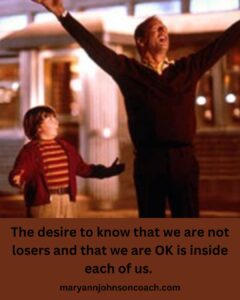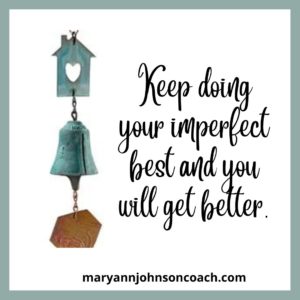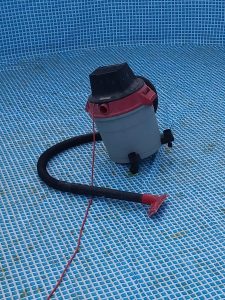 From the movie The Kid
From the movie The Kid
The 40-year-old man and the eight-year-old boy sat together in the airport diner, eating fries and burgers. They each thought their own thoughts about life, as it is and as it would be. The man and the boy were the same person, who, through some fluke, was in the same space and time together.
8-year-old: You’re not mad?
40-year-old: About what?
8-year-old: That we didn’t change anything.
40-year-old: No. Are you ok that you’ll have to fight that bully every day for the rest of grade school and go through high school ugly?
8-year-old: But not dumb.
40-year-old: No, not dumb. And that you’ll go through college without a date.
8-year-old: And get to be 40 with no family.
They look at each other and smile. Then, a dog named Chester grabs a fry, and they run out to the tarmac and see the 70-year-old man. He too is them. He has a family and flies a plane.
40-year-old: Are you who I think you are?
70-year-old: Smile and a nod.
40-year-old: How did we do it?
70-year-old: You have 30 years to find out.
And here is what they all three know – We can do this; it will all work out, and dreams do come true.
As the 70-year-old flies away with his family, we hear the 8-year-old and the 40-year-old shout, “We made it! We’re OK! We’re not a loser! We grew up to be a pilot with a family!” Then they do a happy dance.
Wouldn’t it be wonderful to know, for sure, that despite how now looks and feels, you are going to be OK? Wouldn’t it be nice? The desire to know we are not losers and are OK is inside each of us.
When I was sixty-two, I emailed a very successful, well-known woman and asked her to help me with something in my business. It was as intimidating to me as writing the queen. She responded. shocked that I would think enough of her to ask. Imagine! We shared our hopes, dreams, struggles, and some of our fears. Here’s what I discovered: She is me, and I am her. We are more alike than we are different. I think that’s true of all of us. We worry that what is coming won’t live up to our expectations, that we won’t live up to our expectations.
Here is what I know:
• Today is all there is, so rejoice and be glad in it.
• Everything won’t work out or be easy, but it will be all right in the end.
• You do not carry your load alone, no matter how it feels.
• Time heals all wounds if we let it and seek resources and help.
• Everything changes, and that is a good thing, even though it feels scary at times.
• We are all more alike than we are different.
• We all struggle in one way or another, so be kind to everyone.
• You have more power than you know.
I wrote these words when I was sixty-two, a baby compared to now! I am seventy-five and sharing these thoughts again because not only have they not changed, but they have also become truer in my heart and life. I know they are true!
On the wall in my office/bedroom, I have these thoughts printed:
The Lord has a plan for me, and it will be a GIFT! Mary Ann Johnson
Life is incredibly unfair – in your favor. Jennie Taylor
Whatever my lot thou hast taught me to say, “It is well with my soul.” From the Hymn, It Is Well With My Soul by Horacio Spafford
We want everything to happen for a reason. A better mindset might be to let God make reason of everything that happens. Jennie Taylor
We can feel heartbreak and joy at the same time. Matt Haig
You can’t wait until life stops being hard to be happy. Jane Marczewski – Nightbirde
If you do your best, it will all work out. Mary Ann Johnson
Our dreams can come true. We can live up to our expectations. There is a plan, and we fit perfectly into it. It may not happen in the time frame we want, but if we hold on to hope and believe in ourselves, we will win.



 I walk daily. Walking is the only exercise I get because, as I understand it, you can’t count housework. LOL I walk five blocks. A while back I decided to run those five blocks. I have never liked running, but in February of this year, I decided to run. The goal I set was to run the full five blocks by September. In the article I wrote sharing
I walk daily. Walking is the only exercise I get because, as I understand it, you can’t count housework. LOL I walk five blocks. A while back I decided to run those five blocks. I have never liked running, but in February of this year, I decided to run. The goal I set was to run the full five blocks by September. In the article I wrote sharing 
 You don’t always know the impact for good you have on your kids and others, even when you aren’t perfect. Just a couple of weeks ago this was brought home to me. I went to my sister’s home and her daughter was there with her son Jordan.
You don’t always know the impact for good you have on your kids and others, even when you aren’t perfect. Just a couple of weeks ago this was brought home to me. I went to my sister’s home and her daughter was there with her son Jordan. he was four and five, he came to my home to be babysat now and then. Deidra, his mom, reminded me of this. I had totally forgotten that I cared for Jordan. She also reminded me of something else.
he was four and five, he came to my home to be babysat now and then. Deidra, his mom, reminded me of this. I had totally forgotten that I cared for Jordan. She also reminded me of something else. When Jordan came to my home, he fell in love with a chime I had. It had a lovely bell on the end. He would stick it in the back pocket of his shorts and prance around to hear it ring. I gave it to him as a gift. Jordan was standing there as his mom related this story to me. He smiled. What his mom said next blew me away. “You still have that chime in your room, don’t you Jordan.” He nodded yes.
When Jordan came to my home, he fell in love with a chime I had. It had a lovely bell on the end. He would stick it in the back pocket of his shorts and prance around to hear it ring. I gave it to him as a gift. Jordan was standing there as his mom related this story to me. He smiled. What his mom said next blew me away. “You still have that chime in your room, don’t you Jordan.” He nodded yes.
 The trip was a mixed bag, if I am honest. The kids and I had some great times, and I kept Gus worn out. : ) He had one nap and wanted another Saturday, but we were busy. This from a boy who has all but given up naps.
The trip was a mixed bag, if I am honest. The kids and I had some great times, and I kept Gus worn out. : ) He had one nap and wanted another Saturday, but we were busy. This from a boy who has all but given up naps.


 This summer my grandchildren spent hours with their friends in the pool in our back yard. Sadly, the weather cooled and so the pool was drained for the winter. Due to the placement of the drains three inches of water remained in the pool. Time passed.
This summer my grandchildren spent hours with their friends in the pool in our back yard. Sadly, the weather cooled and so the pool was drained for the winter. Due to the placement of the drains three inches of water remained in the pool. Time passed. and throw it over the side. Each load of water in the shop vac was three buckets to dump. I know it doesn’t seem like much of an improvement, but it was. It felt easier even if it wasn’t faster.
and throw it over the side. Each load of water in the shop vac was three buckets to dump. I know it doesn’t seem like much of an improvement, but it was. It felt easier even if it wasn’t faster. It was done and it looked fabulous. When I began the job, it was intimidating. After all, I’m 69, it was a lot of work and took a lot of time. I didn’t know if I could do it. But I was determined. I did what I could with what I had and as I went along my resources and support improved and I was able to finish the job.
It was done and it looked fabulous. When I began the job, it was intimidating. After all, I’m 69, it was a lot of work and took a lot of time. I didn’t know if I could do it. But I was determined. I did what I could with what I had and as I went along my resources and support improved and I was able to finish the job.


 God must have wanted to see how serious I was about the question because I prayed that same prayer every day for three months! Then one night I knew the answer – stop complaining!
God must have wanted to see how serious I was about the question because I prayed that same prayer every day for three months! Then one night I knew the answer – stop complaining! made a serious decision to become a more charitable person, less judgmental. That has been a work in progress too. Here is how they’re connected.
made a serious decision to become a more charitable person, less judgmental. That has been a work in progress too. Here is how they’re connected.

 never occurred to me that it would be useful to have some type of plan, to learn new skills, to be clear that things don’t always work out the way you think they should and that people, even kids, get to decide how they want their lives to look and feel. It was sometimes a jolting and unnerving experience.
never occurred to me that it would be useful to have some type of plan, to learn new skills, to be clear that things don’t always work out the way you think they should and that people, even kids, get to decide how they want their lives to look and feel. It was sometimes a jolting and unnerving experience. Take my word for it, that it is wasted energy. Instead, celebrate the fact that you are a mother, that you are doing the best you can, and that you do have good desires in your heart for your family. Then get more education. Learn something new. Practice a skill you need and don’t quit till you are reasonably good at it. Be proactive. Mentor with a mom who is where you want to be. Keep working on yourself. Keep loving your family. Keep going!
Take my word for it, that it is wasted energy. Instead, celebrate the fact that you are a mother, that you are doing the best you can, and that you do have good desires in your heart for your family. Then get more education. Learn something new. Practice a skill you need and don’t quit till you are reasonably good at it. Be proactive. Mentor with a mom who is where you want to be. Keep working on yourself. Keep loving your family. Keep going!
 who reminded him of the principle we’ve been discussing—simple things, done over time consistently, bring significant results. His servant said, “If the prophet had bid thee do some great thing, wouldest thou not have done it? How much rather then, when he saith to thee, Wash, and be clean?” (2 Kings 5:13).
who reminded him of the principle we’ve been discussing—simple things, done over time consistently, bring significant results. His servant said, “If the prophet had bid thee do some great thing, wouldest thou not have done it? How much rather then, when he saith to thee, Wash, and be clean?” (2 Kings 5:13).